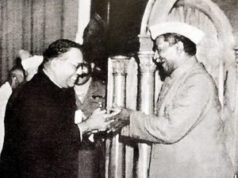A seminar was held in Agra recently to discuss ‘Public Sector Undertakings and Privatisation’. Participants who made it to Agra included Economists: Prof. Gangadhar Gadgil, Prof. P. Brahmananda and D. R. Pendse; Industrialists L Viren Shah, D. N. Patodia and P Gupta; Consumer activists: H. D. Shourie and M. R. Pai; Journalist: Swaminathan Anklesaria Aiyar and Parliamentarians: Jaswant Singh and Minoo Masani.
Prof. Gangadhar Gadgil in his paper [presentation] maintained ‘that it was not only the commitment of the political leadership to socialism but the economic climate and socio-political considerations that had led to the development of the public sector and its dominant role in our economy. Yet, what was accepted as inevitable and socio-economically necessary, had now become an obsession and a dogmatic belief resulting in harmful economic consequences.’ There was little, if any, quarrel with Prof. Gadgil’s assessment. In fact the consensus view was that public sector undertakings had performed poorly, ‘created vested interests, and led to lack of accountability, lack of competition, outdated technology, financial indiscipline, and overstaffing.’ There was also a general acceptance of the fact that it was quite unnecessary for the State to have entered a whole lot of areas ranging from the baking of bread to hoteliering.
But here the consensus seemed to end because there was a fairly strong minority view that the State had no business, in the first place, to enter the world of business, industry and trade. Turning to the question of privatisation, Mr. D. R. Pendse took the view that privatisation did not merely mean divestiture and de-nationalisation but had a much wider concept which included: a) Divestiture and De-nationalisation; b) Any measure of economic policy which reduces the role of the State sector and permits involvement of the private sector; c) Franchise financing, cooperation of the private sector to take up contracts for building infrastructure facilities; d) The closure or liquidation of sick state sector units; e) Transfer of management and control of state-owned enterprises to more efficient private agencies; f) Widening progressively, areas of operation for private and voluntary sectors and their replacement of government departments. One could argue over what, in my opinion, is the watering down of a clear concept: to me privatisation means the State selling off all or part of an enterprise it owns to the public. This is what the British Prime Minister, Margaret Thatcher had done and is doing. But then it is the prerogative of economists to make the simple sound difficult. But even this diluted description is acceptable for starters. However what really saddened me was a discussion on the need to find a better word than ‘privatisation’. Why? Because the word would not be ‘popular’; because people are liable to misunderstanding it (as a move away from socialism to capitalism).
Way back in 1959, when the Swatantra Party was formed and its Statement of Policy was being discussed, I recall the concern in the face of some ex-Congressmen, who had joined the new party, when the policy statement categorically repudiated socialism. ‘Oh no you can’t do that!’ they said. ‘We’ll never be popular!’ ‘Why not instead state that the Swatantra Party believes in Gandhian Socialism?’, they pleaded. To the eternal credit of the then leadership, Rajaji and Masani among them, this plea to hoodwink the public by pinning a misleading label was turned down.
Those thoughts came rushing to my mind when the advisability of the label ‘privatisation’ was being discussed. In our personal lives, we use the word ‘private’ without any sense of guilt. Ask any small paan wala and he will with pride proclaim it to be his private business. Ask any small farmer and he will say it is his private farm or land. Most of us jealously guard our private possessions, be it a woman’s jewellery or a young man’s cycle. The people understand perfectly what the word ‘private’ means. There is no stigma of any kind attached to it. Then why the dry debate? I could only conclude that many of us are still prisoners of words. We have been successfully sold not only what words like socialism, capitalism, profit and private ought to mean but have come to accept unthinkingly value concepts attached to such loaded meanings. The debate also reflected (what should be the prerogative of politicians) that the label is the thing irrespective of content — an implication that by and large, people are fools and all one has to do is package the thought or sugarcoat the pill. The pity is that while people the world over (including our own) are moving away from ideology to reality, we are still clinging to outdated notions of what is or is not acceptable to people. Ask anyone who has to deal with a government department or agency or undertaking (and that means most of us) and he will say privatisation is not a dirty word — not anymore anyway.
Post Disclaimer
The opinions expressed in this essay are those of the authors. They do not purport to reflect the opinions or views of CCS.






